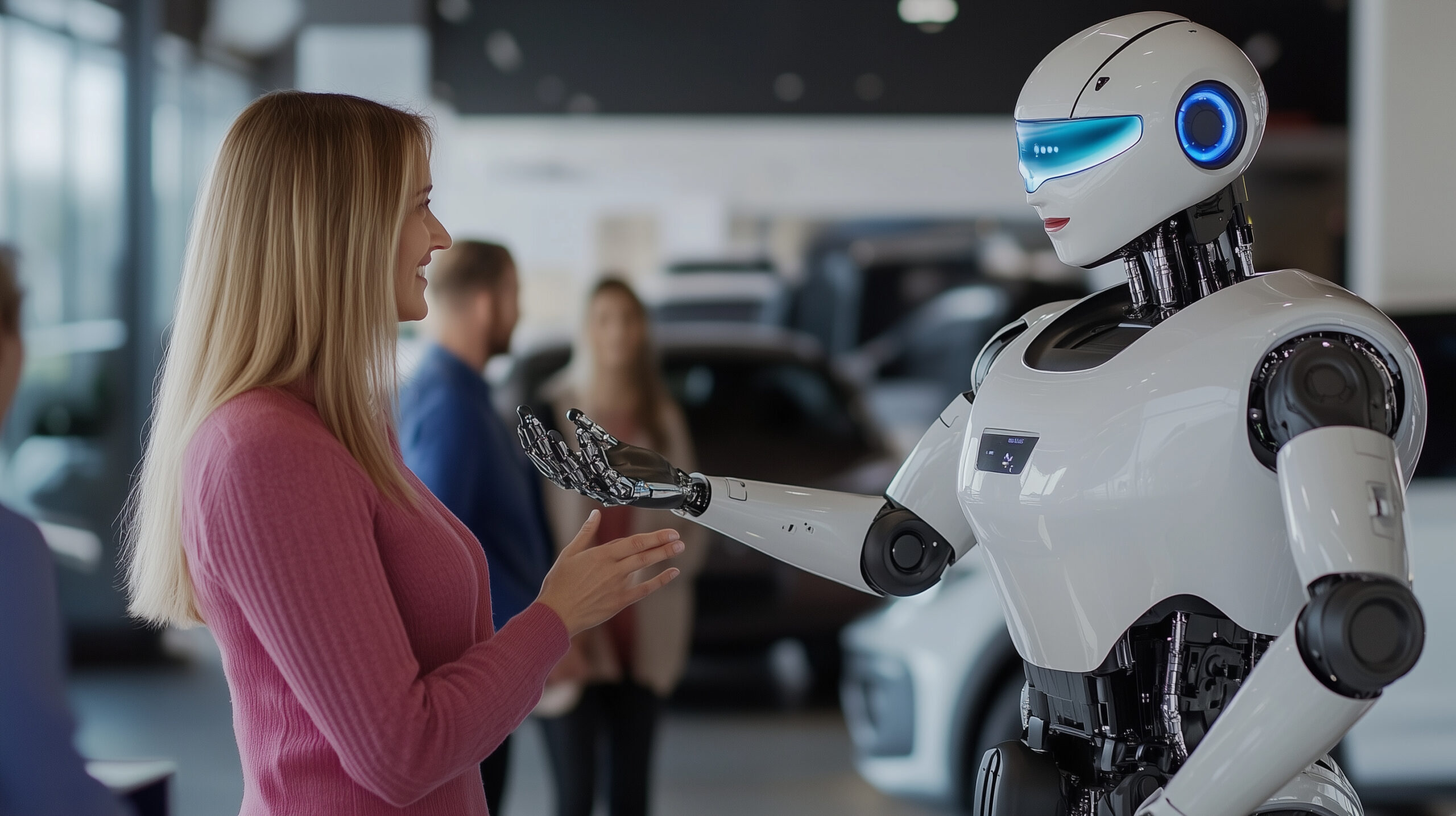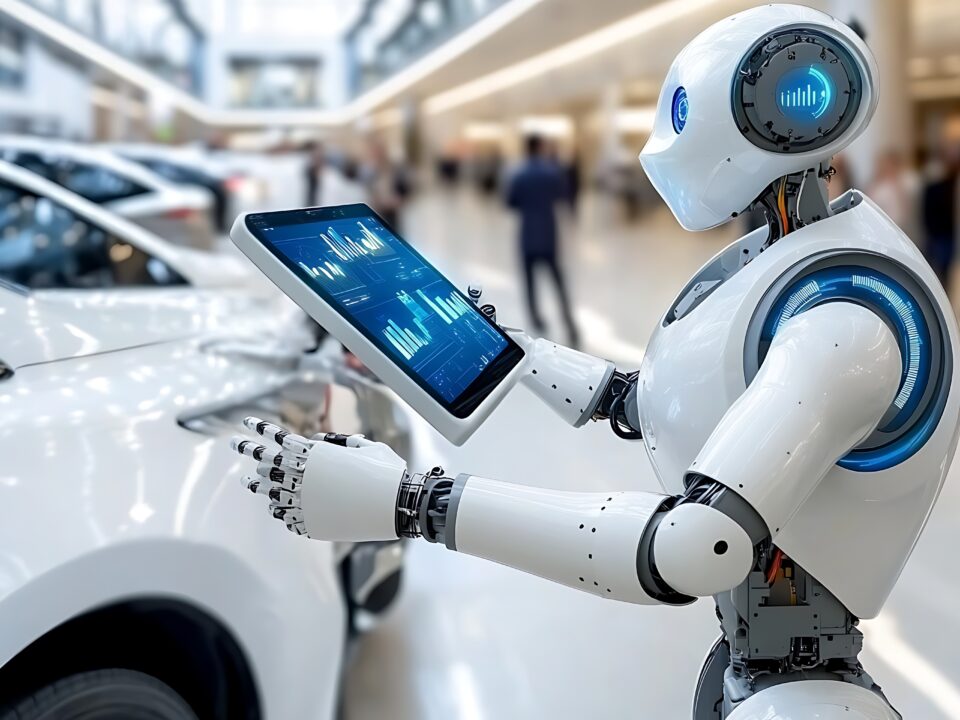
What About Social Media Marketing?
August 16, 2021
Digital Marketing Strategies: AI’s Role in Auto Sales
May 22, 2025Tier 3 automotive marketing is undergoing a seismic shift as artificial intelligence (AI) revolutionizes dealership strategies. With the global AI automotive market projected to reach $134.3 billion by 2033, dealerships are leveraging AI-powered tools to enhance customer engagement, optimize operations, and future-proof their businesses.
Key Takeaways:
- AI enables hyper-personalized marketing campaigns, increasing email open rates by 25%
- Predictive analytics and sentiment analysis improve lead management and customer service
- AI-driven inventory management reduces overstock costs by 30%
- Dynamic pricing algorithms can increase profit margins by 12-18% on aged inventory
- Dealerships must address data privacy and bias concerns when implementing AI solutions
AI Revolutionizes Tier 3 Automotive Marketing
The automotive industry is experiencing a seismic shift as AI technologies reshape traditional marketing strategies. Tier 3 marketing, which focuses on hyper-local dealership campaigns, is at the forefront of this transformation. By harnessing the power of AI, dealerships can now offer personalized experiences, optimize inventory management, and implement dynamic pricing strategies.
According to Market.us, the global AI in automotive market is set to grow at a staggering 37.4% CAGR from 2025 to 2034. This rapid growth underscores the critical role AI is playing in shaping the future of automotive retail. Dealerships that embrace these technologies stand to gain a significant competitive edge in an increasingly digital marketplace.

Enhancing Customer Engagement with AI-Powered Tools
AI is revolutionizing how dealerships interact with potential customers. By leveraging predictive analytics and machine learning, dealerships can create hyper-targeted campaigns that resonate with individual preferences and behaviors. This personalized approach has led to a remarkable 25% increase in email open rates, as reported by TECOBI.
One of the most impactful AI applications in customer engagement is sentiment analysis. TECOBI’s call-recording system, for instance, analyzes customer sentiment in real-time, allowing sales representatives to adjust their approach on the fly. This technology not only improves customer satisfaction but also increases the likelihood of successful sales conversions.
AI integration with Customer Relationship Management (CRM) systems has also proven to be a game-changer. Dealerships using AI-enhanced CRM tools have reported:
- A 40% reduction in follow-up time through predictive lead scoring
- Recovery of 15-20% of previously lost leads
- Improved accuracy in identifying high-potential customers
Optimizing Operations and Pricing Strategies
Beyond customer engagement, AI is transforming dealership operations and pricing strategies. AI-driven inventory management systems are predicting stock needs with up to 90% accuracy, leading to a 30% reduction in overstock costs. This level of precision ensures that dealerships maintain optimal inventory levels, reducing carrying costs while maximizing sales opportunities.
Dynamic pricing algorithms powered by AI are another area where dealerships are seeing significant returns. These systems can increase profit margins by 12-18% on aged inventory by adjusting prices in real-time based on market demand, competitor pricing, and inventory age. This agile pricing strategy helps dealerships move stock more efficiently while maximizing profitability.
In the service department, computer vision systems are cutting processing time by half. These AI-powered tools can quickly assess vehicle condition, identify issues, and even suggest repair solutions, streamlining the entire service process. Similarly, in manufacturing, Tesla’s AI-powered robots have demonstrated a 45% reduction in production errors, showcasing the potential of AI across the entire automotive value chain.
Future-Proofing Dealerships: Challenges and Trends
While the benefits of AI in Tier 3 automotive marketing are clear, dealerships must also navigate potential challenges and emerging trends. Data privacy is a primary concern, with automotive firms facing average annual costs of $4.7 million due to privacy violations. Implementing robust data protection measures is crucial for maintaining customer trust and complying with regulations.
Another significant challenge is the need for staff training. The cost of preparing employees to work with AI systems averages $12,000 per employee. However, this investment is essential for dealerships to fully leverage AI technologies and remain competitive in the evolving market.
Dealerships must also be aware of potential biases in AI systems. For example, 23% of AI-driven credit approval systems have shown bias against minority applicants. Addressing these issues is crucial for ensuring fair treatment of all customers and maintaining ethical business practices.
Looking ahead, several trends are shaping the future of AI in automotive retail:
- By 2026, 45% of service appointments are expected to be booked via AI voice assistants
- Blockchain-AI hybrids are projected to cut administrative costs by 25%
- Generative AI is set to transform marketing content creation and customer interactions
As the automotive industry continues to evolve, dealerships that embrace AI technologies while addressing potential challenges will be best positioned for success in the competitive Tier 3 market. By leveraging AI for personalization, operational efficiency, and strategic decision-making, dealerships can create exceptional customer experiences and drive sustainable growth in the years to come.
Sources:
Market.us AI in Automotive Market Report (2025)
McKinsey & Company: AI in the Workplace (2025)
Gartner Digital Automaker Index (2024)
Veritis: The Impact of AI in Automotive
CB Insights: How AI is Reshaping the Auto Industry
TECOBI: Future of Dealership Marketing (2025)
Intelegain: AI Driving Automotive Innovation (2024)
Synopsys: Levels of Vehicle Autonomy
ZF: Levels of Automated Driving
Torc Robotics: Understanding Autonomy Levels
Ciklum: 2025 Automotive AI Predictions
Infillion: Tier 2 and Tier 3 Advertising Strategies
WorthAdvisory: Tier 3 Campaigns
McKinsey: Automotive AI Trends (2025)





